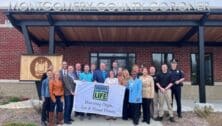Nationally Renowned Development Consultant Shows Businesses and Nonprofits How to Ask for Money


Grammatically speaking, the word money is nothing but a harmless noun. A collective noun, to be exact.
However, in society, it is so much more, as the mere mention of those two syllables has the potential to elicit a wide range of sentiments.
Money is a notion that can mean success, power, freedom, and accessibility. More often, though, it translates into anxiety, even fear.
“Money is an emotional firecracker,” said Laura Fredricks, a development consultant and a nationally renowned expert on asking for dough. “People who worry about money are three times more likely to have digestive disorders, 10 times more likely to suffer from headaches, and six times more likely to experience depression.
“So many decisions in our lives involve money: Do I buy a cup of coffee, or do I make it at home? Buy lunch or pack it? Do I go on vacation or not?”
Thursday morning at the Chester County Economic Development Council in Exton, Fredricks wowed a crowd of approximately 100 movers and shakers, partly from the region’s business sector, but mostly from its nonprofit arena.
The petite woman, who is slight of build but large in stature and brimming with inspiration, gleefully shared her tips on how to understand your relationship with money and how to secure more funds for your cause while not being intrusive.
 The seminar was hosted by a collaborative of the Brandywine Health Foundation and MONTCO Today.
The seminar was hosted by a collaborative of the Brandywine Health Foundation and MONTCO Today.
“They say money is the root of all evil,” said Ken Knickerbocker, MONTCO Today’s publisher. “But without it, our organizations would shrivel up.”
Fredricks is the author of a handful of books on raising money, including most recently, The A$K: How to Ask for Support for Your Nonprofit Cause, Creative Project, or Business Venture.
“My goal is to get businesses and nonprofits to speak each other’s language,” she said. “There are 1.4 million nonprofits in the United States fighting for donors. So the process of asking is important.
“After all, the quality of your life is dependent upon the quality of the questions you ask.”
As such, the attendees posed a litany of them, which in turn guided the advice Fredricks offered:
- How do you differentiate your nonprofit from others?
- When in your relationship with a potential donor is it appropriate to ask for money?
- How can you become less nervous when asking?
- How do you create a sense of urgency in others?
- How can you communicate better with your board of directors?
- How can you get more donations, not just sponsorships?
- How can you articulate the tangible benefits for both parties involved?
- How can you drum up support for a nonprofit that is politically polarizing?
- How do you ask for money in hard economic times?
“It’s important to first listen,” Fredricks instructed her audience. “The more you listen, the closer you get to the point where you can ask for money.”
Fredricks stressed the notion of understanding what money means to yourself, then learning about what it means to the person you’re pitching.
“You have to be on the same page,” she said.
Fredricks has a readiness formula that provides a blueprint for the often-difficult-yet-always-necessary task of asking, and it includes education, involvement, cultivation, inclination, and assets.
“In order to be successful with any Ask, you need to know who to ask, in what order to ask, and when to ask,” she said.
At the conclusion of the three-hour seminar, the audience seemed eager to put its new knowledge to work.
“I’m a decade into fundraising, and I’ve started to feel like I know what I’m doing,” said Toren Peterson, Manager of Business Relationships for the United Way of Chester County. “But it’s important to get out and hear what other people are doing.
“To get an education from someone like Laura is a great opportunity. I’m walking away with some better habits, and the ability to identify my bad habits. It’s great to be in a room like this. We’re all competing for the same resources, but we each have our own different stake in the game. Hey, we’re all in this together.”
Stay Connected, Stay Informed
Subscribe for great stories in your community!
"*" indicates required fields




























![95000-1023_ACJ_BannerAd[1]](https://montco.today/wp-content/uploads/sites/2/2023/03/95000-1023_ACJ_BannerAd1.jpg)
![ForAll_Digital-Ad_Dan_1940x300[59]](https://montco.today/wp-content/uploads/sites/2/2022/06/ForAll_Digital-Ad_Dan_1940x30059.jpg)












